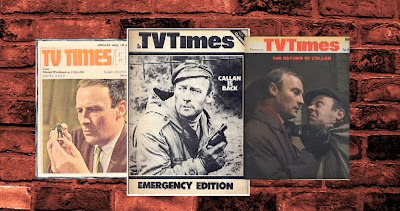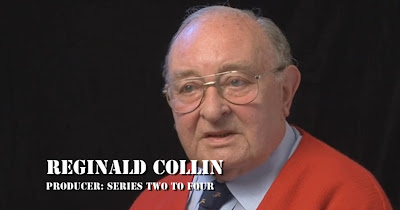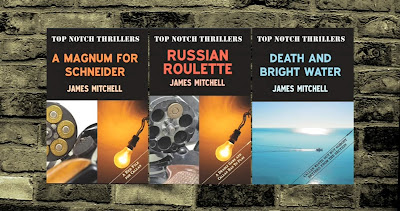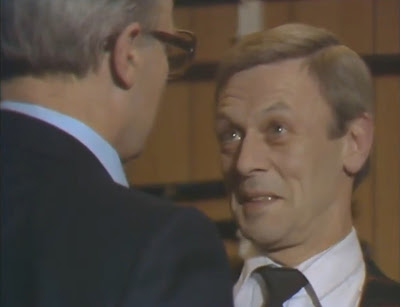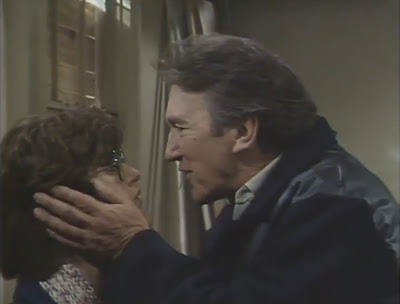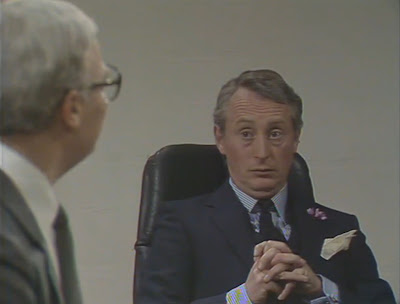Publication Date: 2002. Written by: James Mitchell. Published by: Severn House. 192 pages.
THE PLOT:
Callan has basically won at Life. He is wealthy, owing to his investment in Roger Bullivant (Lonely), who improbably had the exact right mind to become a massive success when the digital revolution exploded. Callan now owns a large estate, complete with servants and enough money that he doesn't have to be careful how he spends it.
He is also in love, having fallen for Fiona Wilton, a woman whose late husband's gambling addiction had left her and her daughter Ellie broke. His meeting Fiona is not chance. Her daughter has recently divorced Voss, a sadistic former Stasi operative who had kidnapped Callan at the end of the 1980s. Voss was in the process of torturing the one-time Section agent, with Callan saved only by the timely collapse of the Berlin Wall.
Now Voss is back. With the patronage of Callan's treacherous one-time employer, Bishop, Voss has already made one attempt on Callan's life, and the aging spy may not survive the next one. Fortunately, he has allies: The Section as well as the Israeli operative whose life he saved while escaping from captivity. Unfortunately, not all of Callan's allies can be trusted...
CHARACTERS:
Callan: The latter seasons of the series made a point of the fortyish Callan being "over the hill." Smear Job, the last of the 1970s Callan novels, devoted multiple chapters to getting him back into shape. Bonfire Night, by contrast, seems like wish fulfillment, with the character spared from any of the limitations that plagued his aging and ailing creator. If anything, he's more fit in his sixties than he was in his forties. A couple of interesting character notes break through, with Callan more haunted by Voss's past torture of him than he wants to let on. Unfortunately, not enough is made of that past trauma, with most chapters portraying Callan as basically invulnerable.
Hunter: Bonfire Night presents the first female Hunter, probably because James Mitchell also saw Goldeneye. Her introduction is promising, with Callan observing (and telling the reader) that she wouldn't have gotten this position without being formidable, and she quickly gets Callan to discuss his past with Voss and even admit to having been left fractured by the experience. After this strong initial impression, however, Mitchell spends the rest of the novel writing her like most of his female characters: smart enough, but also soft in a way that would never work for any Hunter.
Roger Bullivant/Lonely: Lonely's success has led to him fully assuming the identity he first coveted in Smear Job; and except for when he's introduced, Mitchell is commendably consistent in referring to him as "Roger" and not "Lonely." Bizarrely, I have less of a problem with Lonely the Computer Genius than I do with Callan the Superman. Mitchell's explanation that Lonely was able to see computer code as just another type of lock to be mastered is one that I can just about accept. His success has made him more confident, but he's still socially awkward - It's just that when you're worth billions, people will go along with that. He remains steadfastly loyal to Callan, and his scenes are among the book's highlights.
Fitzmaurice: No, not the same character as in Death and Bright Water and Smear Job. More's the pity, as that Fitzmaurice evolved into a genuinely interesting character. No, this is his son, who is resentful of Callan for exactly one chapter before following him around like a dutiful foot soldier for the entire rest of the novel. He works with The Section, and he and fellow Section agent Mars form a sort of double act, though sadly not a particularly memorable or amusing one.
Fiona: Callan's love interest, she was burned by her marriage to Ellie's father and she hated seeing her daughter suffer in a sham marriage to Voss. She is temperamental, often responding to Callan by throwing breakable objects at him... which seems to be foreplay for her, since the object throwing is regularly followed by sex. She works reasonably well as a foil for Callan, being too smart and too stubborn to be satisfied by his surface glibness. At his height as a writer, James Mitchell could have made a memorable romance - though sadly, this book does not represent the writer at his height.
BACKGROUND:
I debated whether or not to include Bonfire Night in my Callan reviews. As the foreword by Peter Mitchell details, this was a book written while James Mitchell was in decline. Per the younger Mitchell, it was wonderful therapy for the aging writer... but it's not a book that should ever have been published.
If this had been a Hemingway-like case of something from a bottom desk drawer being put out posthumously a decade after the fact, then I would likely have treated this as a non-professional work and respectfully omitted it. Even now, it feels almost unfair to include this alongside novels that were written when Mitchell was in full control of his craft.
However, this was not written exclusively as self-therapy, and Mitchell didn't shove it onto a personal bookshelf or into a bottom drawer. He wrote it for publication while he was still alive. As such, and however bad I may feel about it, the final novel for both David Callan and author James Mitchell has to be reviewed on that basis.
THOUGHTS:
I'll start with the positive. I've read far worse books than this one. James Mitchell may have been in decline, but his ability as a writer still comes through at several points.
There are excellent individual moments: Callan and Hunter, talking about the fall of the Berlin Wall while looking out on the equipment in the junkyard that is The Section's cover; the way that junkyard equipment, which seems to just be there to lend extra atmosphere, ends up actually being folded into the narrative; a reflective conversation between Fiona and her uncle; and, unsurprisingly, most of the interactions between Callan and Lonely. In these and a few other scenes and chapters, I found myself getting sucked in.
The story is simple, probably the simplest of any of the Callan novels, but it isn't well told. There's a vague sense that important scenes just aren't there. Multiple chapters see Callan and other characters talking, often in Callan's mansion, with the plot seemingly having advanced offstage. Characters are introduced, then go unmentioned for half the book, with us just expected to remember them when they pop back up suddenly. As a result, what should be a straightforward narrative is left seeming muddy and hard to follow.
The Voss storyline gets relatively little focus, which I'm fine with, because Voss is a dull villain. He's only directly seen a couple of times, once near the beginning when Ellie demands a divorce, then in the middle when he's acting against Callan, and - of course - at the end. Exactly none of these appearances show him as particularly formidable. He's ultimately just a pawn being used by the (entirely offstage) Bishop, and I'm fairly certain Mitchell had a follow-up in mind with Callan going after Bishop directly.
Mitchell seems more interested in the romance between Callan and Fiona. This works better than the spy plot, because it actually feels as if we're seeing all of this story. Even so, it becomes repetitive. Callan never struggles to achieve any goal. He wants Fiona, he gets her. She gets mad at him a few times and throws things, but there's never any tension, any sense that he might genuinely lose her. This leaves the romance just as lacking in stakes as the spy story.
A significant misjudgment, in my opinion, is the decision to set this in the then-present. Mitchell's sensibilities are very much those of the 1970s and '80s. There's a scene in a hippy bar that is absolutely ludicrous in a story set in 2002. The same scene would be perfectly fine if the story was taking place in the late 1970s or the early 1980s. Losing the Berlin Wall backstory would be a pity, as those references work quite well, but I think it would be a fair trade if it meant the story actually belonged to the world in which it's set.
OVERALL:
Bonfire Night is a frustrating read. The book isn't so much mis-structured as unstructured, a morass of scenes that mostly just exist instead of building on each other. The plot is simple, but it's told in a way that makes it difficult to follow, as if big chunks of the story are simply missing.
Every time I started to fully dismiss it, author James Mitchell would deliver an excellent moment that would remind me why I'd become interested in these characters in the first place. But every time something caught my attention, the book would quickly go back to seeming unformed. Add in a weak villain and a protagonist who feels less like Callan than like a retired version of the Sean Connery James Bond, and the results are uninvolving.
In the end, both the television and literary Callans came to their natural ends, only to return with disappointing revivals: Wet Job on television, Bonfire Night in print. In both cases, I'm left thinking that the character's legacy would have been stronger if he had been left in the 1970s, where he seemed to truly belong.
Overall Rating: 3/10.
Previous Novel: Smear Job
Review Index
To receive new review updates, follow me:
On BlueSky:
On Threads:







